Sleepless nights, hope and unknowns: Clinics and anti-abortion groups prepare for new law
A year ago, when the world Calla Hales had known her entire life shifted, she estimates she didn’t sleep for three or four nights straight.
But not at first. The executive director of A Preferred Women’s Health Center in Charlotte had braced herself for the U.S. Supreme Court to overturn Roe v. Wade and eliminate the constitutional right to an abortion. She knew it was coming, thanks to a copy of the court’s draft opinion leaked to media.
But weeks later, Hales suddenly found she had no time to rest. In July 2022, a Georgia law banning abortions after six weeks of pregnancy went into effect. Hales’ A Preferred Women’s Health Center operates two clinics in Georgia, along with clinics in Charlotte and Raleigh. Abruptly, she had to worry about a slew of new requirements and hurdles there — along with how to get abortion care for Georgia patients she knew would still need it. She simply didn’t have time to sleep.
So, although Hales has been disheartened and discouraged since North Carolina’s General Assembly passed a law May 16 banning most abortions after 12 weeks of pregnancy, she hasn’t lost sleep. Yet.
But she knows it’s coming.
“I’m expecting that again,” Hales said. “That’s the level of chaos. We’re used to the chaos of changing paperwork, that’s not too different. It just takes time. It’s frustrating.”
Standing in her clinic off Charlotte’s Latrobe Drive on a weekday in early June — a few weeks before North Carolina’s new abortion law goes into effect on July 1 — Hales still was grappling with so many unknowns. She was weary after another long day of work, and her concern showed in all the ways she listed how she’s unsure what, precisely, will happen.
And whether it will all happen after Planned Parenthood South Atlantic and a North Carolina OB-GYN filed a lawsuit June 16 asking a federal court to block numerous provisions they argue are unclear and unconstitutional, or to place an injunction on the law to prevent it from being enforced. A hearing is scheduled for June 28.

Still, Hales had to prepare, and she was waiting for guidance from North Carolina’s Department of Health and Human Services on how informed consent — the process by which every patient must receive counseling before an abortion — would change with the new law. (She would finally receive the guidance June 19.)
She said DHHS also will provide language that clinic staff need to use counseling patients on when abortions are permitted, what exceptions are allowed for an abortion after 12 weeks of pregnancy, and what they’re permitted to tell patients if they’re past the point in their pregnancy when an abortion will be allowed in North Carolina.
She mulled what areas of the clinic could be transformed into a makeshift counseling center, and whether she’d need to somehow wedge cubicles in a clinic where every available space already is being used. Current North Carolina abortion law requires counseling 72 hours before an abortion, but it typically is conducted via phone, Hales said. Her Charlotte building doesn’t have additional dedicated space to provide the individual counseling that now will be required in person.
“This has always been a process,” Hales said. “It’s a very heavy, personal thing for people. For some people it’s an easy decision and some people it’s not — to each their own. But now it’s a much more stressful decision because of so many barriers and so many roadblocks and having to add all these additional strains to people.
“And that takes a toll — not just on patients, but on staff.”
One thing Hales knows for certain, though: Patients will still come.
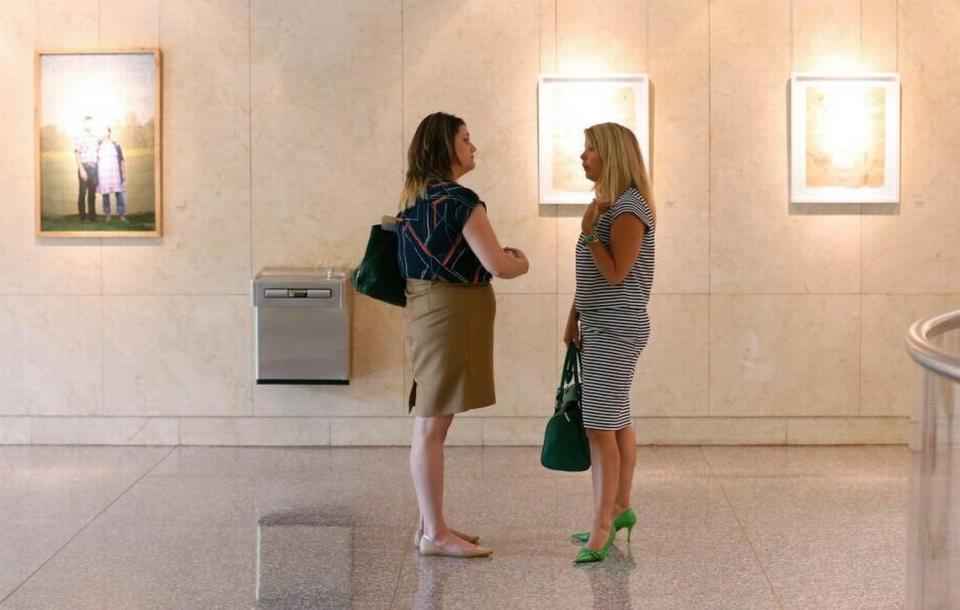
Nearly 50 years of waiting for Roe to fall
While abortion providers were dismayed by how quickly the 12-week ban was unveiled and passed out of the legislature, others were relieved when the bill made it through successfully.
Tonya Baker Nelson, the founder and CEO of Hand of Hope, a Christian ministry that operates pregnancy centers in Raleigh, Fuquay-Varina and Fayetteville, has been waiting for this moment nearly all her life.
When she was in her early 20s, she had an unplanned pregnancy. Her partner pressured her to have an abortion, laying out an ultimatum that it was “either me or the baby.” He left, and Nelson raised her daughter on her own, living in a tiny, subsidized apartment for several years as she struggled to make ends meet.
Despite the hardships, Nelson told The N&O last year, she “loved every second of it, because it was me and my baby.”
Having grown up shocked that abortions were legal in the first place, Nelson said she prayed for decades that Roe would someday fall, sending the question of whether and to what point the procedure should be legal back to the states.
In 2016, a contentious zoning fight over whether Nelson would be allowed to open one of her centers right next to Hales’ clinic in Southwest Raleigh brought the two women face-to-face at a Raleigh City Council meeting.
The dispute continued for years and ended when city officials settled a federal lawsuit Nelson had brought against them.
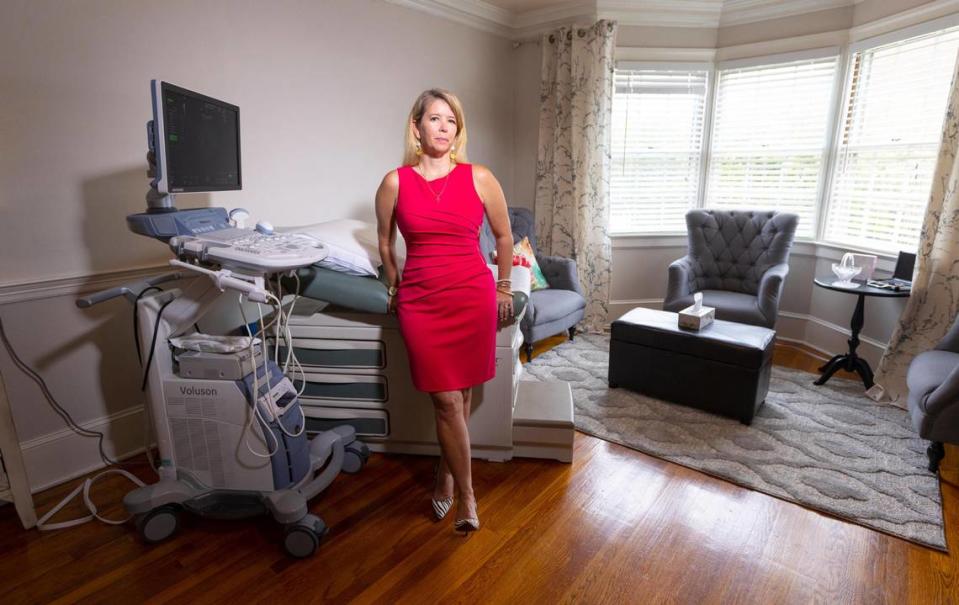
Nelson opened her first pregnancy center in the Triangle in 2005, after coming up with the idea during a discussion a few years earlier at her church, about community needs that needed to be met.
After the court’s decision in Dobbs v. Jackson Women’s Health Organization to overturn Roe was leaked last year, Nelson told The N&O that she was eagerly waiting to see what kind of action Republicans in the General Assembly would take, provided they won enough seats in November to pass a new law over a basically guaranteed veto from Gov. Roy Cooper.
Now that North Carolina is getting ready to lower the timeframe when most abortions are allowed from 20 weeks to 12, Nelson said she is thankful that a stronger law is finally being implemented after nearly 50 years of states having to abide by Roe’s legal protections.
“Abortion hasn’t been taken away in North Carolina, abortion hasn’t been taken away in the United States; there are just stricter laws surrounding that,” Nelson said. “Of course, in other states, there are even stricter laws. But in North Carolina, it’s still legal up to 12 weeks, and I think that is a firm, solid step in the right direction.”
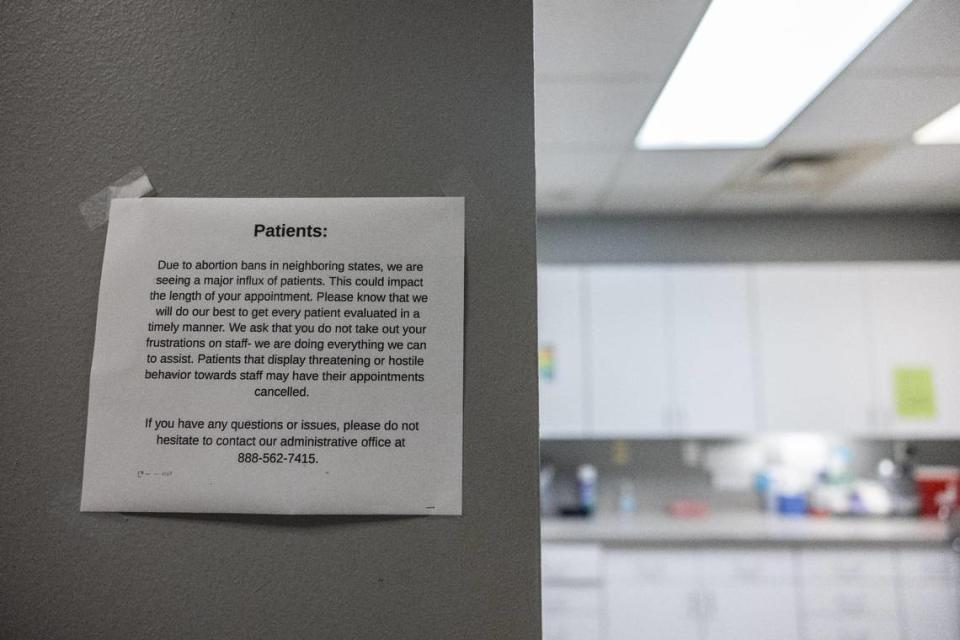
‘We’re failing those people’
A simple typewritten sign hangs on the wall in every room of Hales’ clinic in Charlotte, reminding patients of what has become standard in abortion care in North Carolina in the past year:
“Due to abortion bans in neighboring states, we are seeing a major influx of patients,” it reads. “This could impact the length of your appointment. Please know that we will do our best to get every patient evaluated in a timely manner. We ask that you do not take out your frustrations on staff — we are doing everything we can to assist.”
Since Roe v. Wade was overturned in June 2022, Charlotte’s A Preferred Women’s Health Center has seen more patients than ever, Hales said. That doesn’t mean more people in the state are seeking abortions — but that more have come to North Carolina as it remained one of the least-restrictive states in the South by permitting abortions up to 20 weeks of pregnancy.
Before Roe fell, about 1 in 5 patients were from out of state; in the past year, about double that number have traveled from beyond North Carolina’s borders for abortion care, Hales said. Patients often have to wait precious weeks before an appointment is available, Hales said.
That mirrors a national report that said North Carolina, on the whole, experienced a 37% increase in abortions in the months after Roe v. Wade was overturned. According to WeCount, an abortion-tracking project sponsored by the Society of Family Planning, N.C. providers performed 3,190 abortions in April 2022. In August 2022, a little more than a month after Roe fell, that number rose to 4,360. That marked the largest percentage increase in any state.
According to WeCount, North Carolina has had an increase in abortions of at least 15% each month when compared to April 2022.
Should the law go into effect as planned, July 1 will mark the most significant change in North Carolina abortion law since Roe v. Wade was decided in 1973, even if it affects a small portion of people who have traditionally sought abortions in the state.
According to North Carolina’s 2021 abortion statistics, the most recent released by DHHS, about 7% of abortions in the state occurred after 12 weeks of pregnancy.
But it’s that 7% of people that Hales worries about.
“The people who are coming past 12 weeks are the people who need care the most,” Hales said. “They’re the people who have tried like hell to get here but couldn’t. They’re people who found out they were pregnant late, or this was a wanted pregnancy that wasn’t sustainable. For some folks, they’ve done everything they could to get here from out of state and tried to have all the resources available, but just couldn’t until now.
“And we’re failing those people. We’re failing the people who arguably need our care the most.”
Dr. Beverly Gray, an OB-GYN at Duke Health, who along with Planned Parenthood filed the lawsuit challenging the law, said as the July 1 deadline loomed closer, she started keeping a mental list of all the patients she wouldn’t have been able to care for under the new law.
“There are many onerous requirements that are not there to improve safety,” she said. “They’re there to make it really hard for people to get care.”
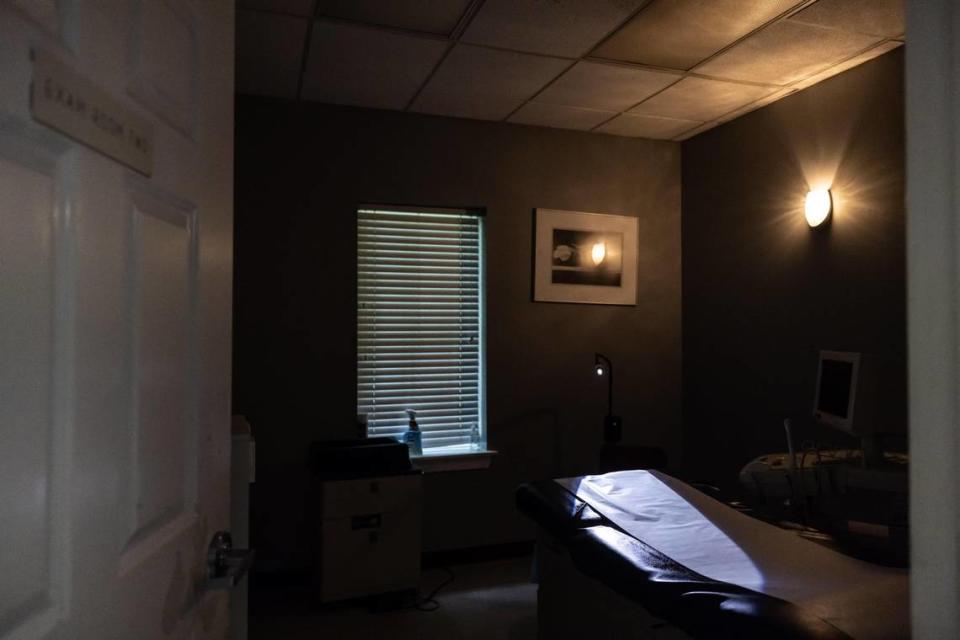
Is criticism of the law fair or ‘hyperbole’?
Critics of the bill have pointed to the additional counseling requirements and other provisions to argue that the 12-week ban will end up being more onerous than it is being made out to be.
But Nelson, who was personally hoping lawmakers would lower the threshold even further to six weeks, is skeptical that women facing the choice of whether to have an abortion will view the new law as extreme or unreasonable.
“That’s hyperbole that it’s a disaster and that it’s a crisis and everything, because the vast majority of women are securing abortions before their first trimester is over, so that’s just not true,” Nelson said. “That’s why I think that’s going to ring empty and hollow because you have all these women who have personally experienced that.”
“For a woman who’s had an abortion, and she hears the word ‘abortion,’ she makes a mental memory bank connection to her abortion experience,” Nelson added. “So, she’s going to know, ‘Oh well, I wasn’t that far along.’ So, whether she’s for abortion or against abortion, she’s still going to engage that core memory.”
Nelson also argues that the 72-hour mandatory waiting period is “crucial” for women who are about to make a “life-changing” decision.
“The abortion industry wants them to hurry up and make a very quick decision, because once that abortion decision is made, there is no undoing that, there just isn’t,” Nelson said. “So, they thrive on, you know, ‘get it, get it, get it, get it, pressure, pressure, pressure,’ and those of us in the pro-life movement, we’re like, ‘OK, chill out just a second, let’s calm down, let’s think through this.’”
Clients who come into one of Nelson’s pregnancy centers receive a pregnancy test, and can choose to get an ultrasound as well. While discussing what they want to do about their pregnancy, they talk with staff about some of the possible physical complications and emotional and spiritual consequences of having an abortion.
If a client doesn’t want to talk about their religious beliefs, that’s fine too, Nelson told The N&O last year.
Depending on what a client needs, Nelson said, visits can include meeting with different medical staff that come to the centers, including nurses, ultrasound techs, certified nurse assistants and volunteer nurse practitioners.
For women who decide to go through with their pregnancies, she said, Hand of Hope becomes a kind of support system where they can sign up for parenting and labor and delivery classes, participate in Bible studies, and get all the necessities they’ll soon need, including diapers, baby wipes, strollers, car seats and more.
Ahead of the new law going into effect, Nelson is getting ready to hire more staff to help with an anticipated rise in clients. She’s also thought about expanding the hours her centers are open, and rearranging their current layouts to accommodate more people.
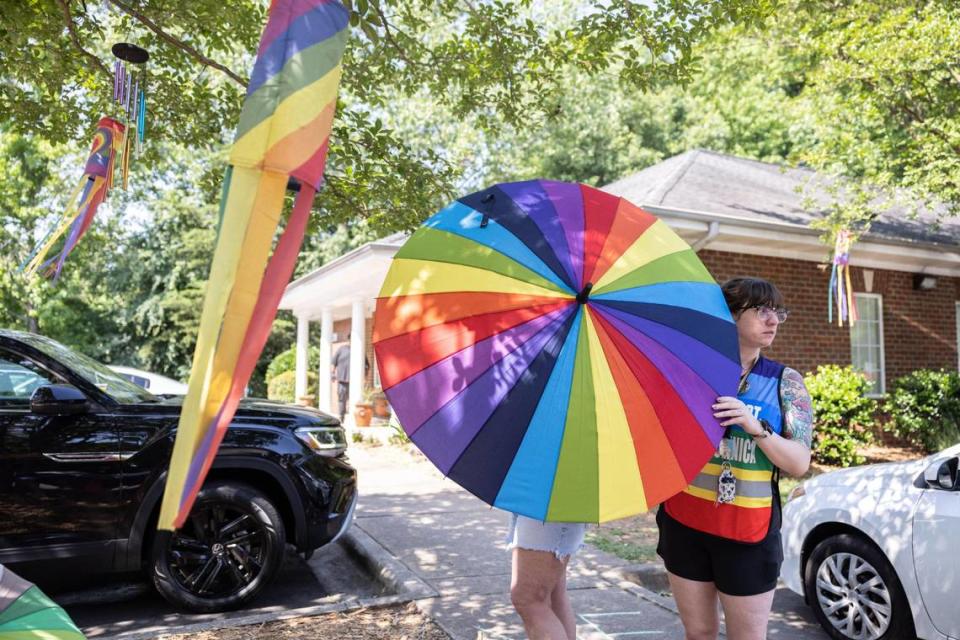
Everyone is exhausted
The sidewalks outside Charlotte’s A Preferred Women’s Health Center are alive with activity on Saturdays when the clinic is at its busiest. Lining the strip of property immediately outside the clinic are volunteers from Charlotte for Choice, who help guide patients into the building and to their appointments.
But on just about every square inch of property across from and next to the clinic are anti-abortion rights protesters who try to steer patients to listen to their case for canceling their appointments.
The clinic is known for having some of the largest and most frequent protests in the country, according to the National Abortion Federation. Dozens from Love Life, an anti-abortion group, gather every day that appointments are scheduled in an empty lot adjacent to the clinic. An LLC affiliated with the group purchased the lot in 2018.
Volunteers from Charlotte for Choice say the “antis” — what they call anti-abortion protesters — have become especially outspoken in the past year, even as they have all seen more patients who seem more desperate arrive more frequently with out-of-state license plates. All day long, someone is either shouting into a megaphone or a band plays loud, Christian rock music. Inside the clinic, a basket of disposable earplugs waits for patients in the lobby.
When Shane Becker first started volunteering for Charlotte for Choice in 2021, it was typical to see about 30 patients come to the clinic on a weekday and maybe 70 on weekends. In the past year, those numbers have increased to closer to 50 on weekdays and more than 100 on weekends, Becker said.
Becker remembers a patient who drove four hours from Tennessee only to tearfully discover that she needed a counseling appointment 72 hours in advance of an abortion appointment, per North Carolina law.
“Even before this most recent ban, there’s so many enforcements behind all the abortion regulations that just simple misunderstandings can cause people to get really frustrated,” Becker said.
Stephanie Leonard, who began volunteering for the clinic last fall, can’t forget the couple who drove overnight from Georgia — where abortion now is prohibited after six weeks of pregnancy — after the patient learned she was six weeks and one day into the pregnancy.
“You see more tired people,” Leonard said. “Everyone just looks so exhausted from all of the hoops that they had to jump through to even get to the point where they can park in our parking lot.”
Rejoice, but grieve
Since the fall of Roe, the past year has been one of hope for the anti-abortion rights group Love Life. But for protesters with that group, banning most abortions past 12 weeks is just a start.
“For me, it’s kind of like two sides to one coin,” said Jonathan DeVore, the Charlotte city director for Love Life. “On one side, I do rejoice over the fact that there will be pre-born humans that live as a result (of the new law). But on another side, I’m grieved knowing that there are still going to be babies that are allowed to be killed in Charlotte and in North Carolina.
“So, I rejoice, but I also grieve.”
Jacinta Robin held signs outside the clinic on a Saturday in June after traveling from Knoxville, Tennessee, with the anti-abortion group Center for Bio-Ethical Reform. She said her group specifically chose the Charlotte location to demonstrate at because she sees an opportunity to reach more people.
And she’s not happy with North Carolina’s law that will prohibit most abortions after 12 weeks, either — because it doesn’t go far enough.
“There’s a lot of ‘two steps forward and one step back’ going on with the abortion policies,” Robin said. “And what we’ve noticed are pro-life laws coming through with a lot of loopholes.”
DeVore said he remains hopeful that a total abortion ban might one day become North Carolina law. “With God, all things are possible,” he said.
But Megan Argabrite, a volunteer with Charlotte for Choice who is also a local Presbyterian pastor, said she has a difficult time believing a higher power would make sweeping declarations.
“I don’t believe that anything in life or faith is black or white or simple and clear,” Argabrite said. “There’s a lot of gray, there’s a lot of complexity. And the reality is, people end up in all kinds of situations and I value the life of the person who is in a situation where they need to consider abortion.”
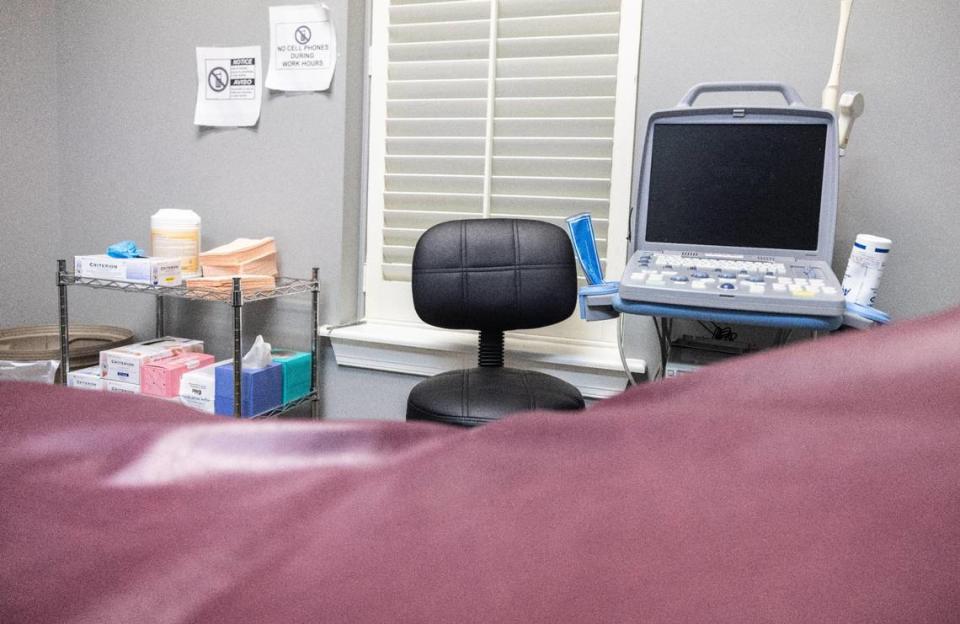
Abortion is still legal
A sign taped to a cabinet in APWHC’s receptionist working area shows a color-coded map of the United States that was made by the Guttmacher Institute, a reproductive rights research organization. Every state is shaded a color ranging from dark turquoise (most protective of abortion rights) to deep red (most restrictive). For now, North Carolina is shaded yellow-orange, for “restrictive,” according to Guttmacher’s scale.
Hales’ staff keeps the map in an area where it can be consulted at any moment — a reminder of how rapidly state abortion laws have changed across the country in the past year. Already, a swath of states from Texas to West Virginia is the deep red of “most restrictive.”
“We’ll be a darker orange soon,” said Hales, referring to the color applied to states Guttmacher deems are “very restrictive,” when the 12-week ban becomes law.
“You’re going to have patients who are not going to be able to get in in time,” she said. “They’re not going to have anywhere to go, and by the time they might be able to get their things together to go somewhere, they’re going to have to travel even further, go out of state. And all those clinics are booked up, too.”
Hales sighed and then straightened, as if steeling herself for a battle to come.
“The endgame is the same: seeing patients and helping them become unpregnant,” Hales said. “That is the endgame. That doesn’t change.”
And a law banning most abortions past 12 weeks of pregnancy means that many patients can still get abortions in North Carolina.
“Abortion is still legal in North Carolina,” Argabrite, the volunteer, said. “It will be legal even after July 1st. It will be a lot harder to access, but it is still legal, so my work doesn’t change.”
News & Observer reporter Teddy Rosenbluth contributed to this story.

